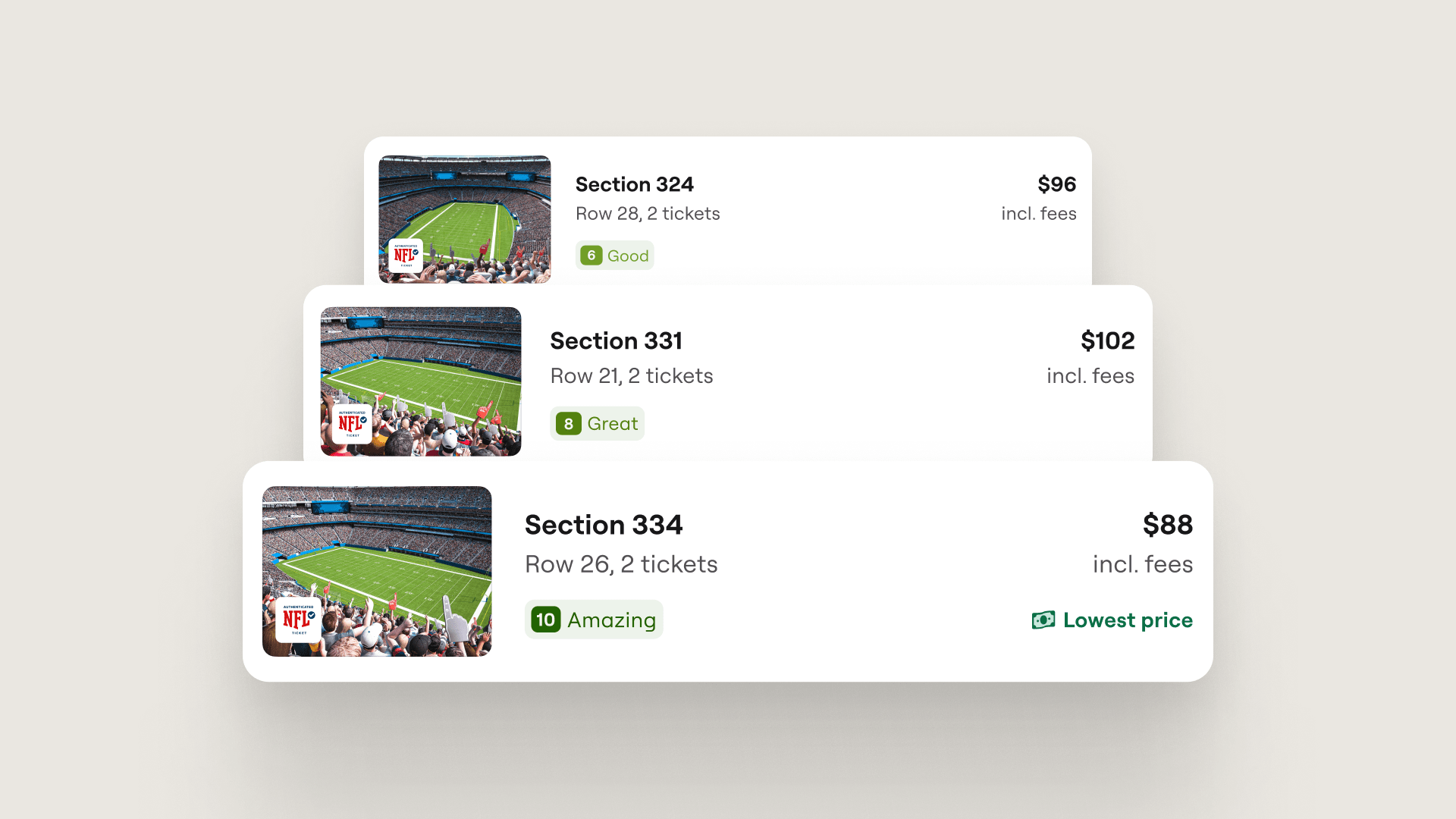Aug 7, 2025
·Emily Kho

When shopping for event tickets, it’s tempting to sort by price and grab the cheapest option. But what if that low-priced ticket has a terrible view or is buried in the nosebleeds?
That’s where SeatGeek’s Deal Score® comes in—helping you make sure you're not just saving money, but actually getting good value for what you spend.
Whether you're buying tickets to a Yankees game, catching a concert at Madison Square Garden or planning a night at Hamilton, Deal Score helps you find the sweet spot between cost and quality.
In this article, we’ll break down how Deal Score works, what it tells you, and how to use it to upgrade your ticket-buying strategy.
What Is Deal Score—and How Is It Calculated?
Deal Score is SeatGeek’s proprietary algorithm that rates ticket listings on a scale from 1 to 10 based on a combination of factors:
Ticket price
Seat location within the venue
Historical pricing trends for similar events and sections
Row and section demand
Seat quality (like views, proximity, and amenities)
A high Deal Score (usually 80+) means the listing is a strong value relative to similar tickets for the same event.
A low Deal Score (below 50) might be a red flag—it could be overpriced, far from the action or in a section with less desirable views.
Think of it as your personal event ticket analyst—comparing dozens of listings so you don’t have to.
Why It’s Different from Just Finding the Lowest Price
Price is only one piece of the puzzle. A $40 ticket on the upper corner of the 300-level at a football game might technically be the cheapest, but if you can get a lower bowl seat for $60 with significantly better sightlines, the value per dollar is much higher.
That’s where Deal Score excels. It doesn’t just show you what costs less—it shows you what’s worth more.
For example:
At a Billy Joel concert at Madison Square Garden, a $150 ticket in Section 212 with a Deal Score of 92 may be a better purchase than a $130 ticket in Section 227 with a Deal Score of 68—thanks to better acoustics and angle to the stage.
For a Giants game at MetLife Stadium, two seats at the same price could have wildly different scores depending on how centered, elevated or obstructed the view is.
By using Deal Score, you avoid the trap of overpaying for a “cheap” seat that doesn't deliver.
High vs. Low Deal Score Examples
To see how Deal Score makes a difference, consider a few sample comparisons from recent events:
High Deal Score (90–100)
You’re getting top-notch value—great view, fair price, solid row/section.
Example: Section 114 at SoFi Stadium for a Chargers game, priced 20% below average but with clear midfield sightlines.
Midrange Deal Score (60–80)
These are decent buys—may not be the best in the venue, but still fair for what you get.
Example: Section 310 at Fenway Park, high elevation but centered view of the diamond.
Low Deal Score (under 50)
These tickets are typically overpriced for the quality. They may be in obstructed sections, poor angles or far from the action.
Example: Far side-stage seats at a concert in a hockey arena, where the sound or visuals may be compromised.
Deal Score takes all these factors into account—so you don’t have to guess whether a ticket is worth it.
Tips for Using Deal Score Filters Like a Pro
On every SeatGeek event page, you’ll see the option to sort by Deal Score—and that’s your ticket to smarter decisions.
Here’s how to make the most of it:
1. Start with “Best Deal” instead of “Lowest Price”
This will bring high-scoring listings to the top of your results, often revealing mid-priced seats with excellent value.
2. Set your price cap, then sort by Deal Score.
If your budget is $150, apply the filter—then sort by Deal Score to see which tickets within that range offer the best bang for your buck.
3. Combine with Seat View photos.
For many venues, SeatGeek provides actual photos or renderings of the view from your seat. Cross-reference this with Deal Score to confirm that a ticket truly delivers.
4. Use the Interactive Map
Hover over different sections on the interactive seating chart and you’ll see Deal Scores change based on seat and price—great for comparing value across the venue at a glance.
How Deal Score Changes Over Time
Deal Scores are dynamic—they update as ticket prices fluctuate, demand changes, and the event date gets closer.
This means:
A ticket that scores 88 today might only score 74 next week if prices drop in better sections.
Last-minute buyers can benefit from falling prices in premium areas. High-end tickets that were overpriced early on may become high-scoring deals closer to event day.
For concerts that don’t sell out—like midweek shows or second nights in a city—Deal Score can help you spot that price drop in real time.
And for sports events with unpredictable demand (think: a Sunday NFL game after a surprise playoff race), Deal Score adjusts to reflect the new value landscape instantly.
Final Thoughts
When it comes to buying tickets, it’s not just about spending less—it’s about getting more. That’s what Deal Score is built for.
Whether you're seeing a show at the Hollywood Bowl, catching a rivalry game at Lincoln Financial Field or just heading out to a last-minute Friday concert, Deal Score helps you make smarter choices every time.
Next time you’re browsing tickets on SeatGeek, don’t just look at the price. Sort by Deal Score, check the view and lock in the seat that gives you the most for your money.
Because good seats are nice—but great deals make them even better.